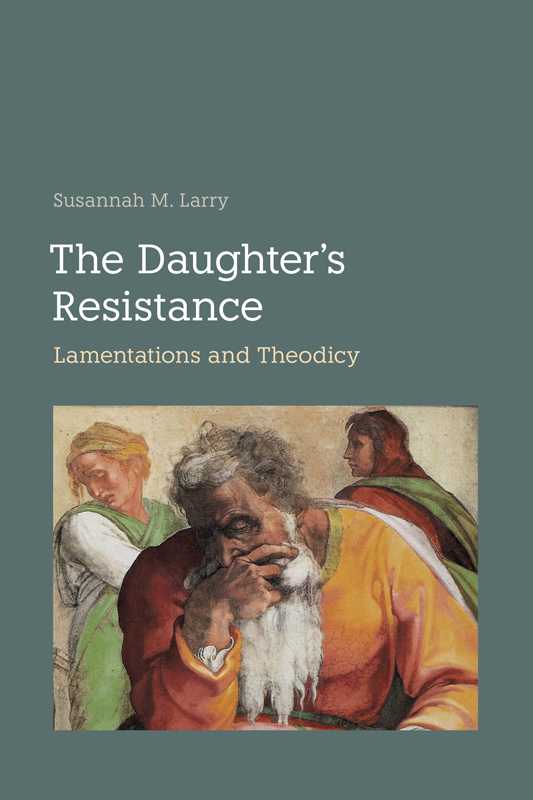The Daughter’s Resistance: Lamentations and Theodicy
Published: Nov 2025
£70.00
Susannah M Larry offers a feminist “history of consequences” of Lamentations, and via a trauma lens, surfaces the rich theodicy of the text. The Book of Lamentations has often become a conversation partner for communities in crisis, and yet, its somber poetry has most often explained the suffering experienced by way of a causal connection between sin and suffering. For many sufferers, especially trauma survivors, this perceived message of Lamentations seems, at best, unhelpful, and, at worst, retraumatizing. Familiar Jewish and Christian readings of Lamentations draw a foregone conclusion: that God has justly commissioned the Babylonian invaders to destroy Jerusalem.
The potential of harm from these interpretations of Lamentations’ can fall especially hard on those who have experienced sexual violence, which figures significantly in the attack against the Judeans in Lamentations. In contexts where rape culture dominates, which already blames the victim for their trauma, biblical interpretations like the prevailing one of Lamentations entrenches unfair stereotypes about victims’ responsibility, while exonerating offenders. And yet, a closer reading of Lamentations reveals a much more nuanced perspective on human suffering. Contrary to popular belief, Lamentations includes as much, if not more, protest of unjust suffering than pronouncement of suffering justified from sin.
Larry seeks to both analyze Lamentations 1–2’s theodicy and the reasons for victim-blaming interpretations in the modern period. The words of the female personification of Jerusalem—Daughter Zion—channel this theodicy especially, and yet the patriarchal exclusion of her voice’s textured response to suffering is lost. The Daughter’s Resistance shows how Daughter Zion resists simplicity theodicy. Through re-reading Lamentations 1-2 through the Mesopotamian forerunners to Lamentations and analyzing its Jewish and Christian receptions, this book suggests that Lamentations offers more resources to survivors than recently thought.
The Daughter’s Resistance: Lamentations and Theodicy
£70.00
Susannah M Larry offers a feminist “history of consequences” of Lamentations, and via a trauma lens, surfaces the rich theodicy of the text. The Book of Lamentations has often become a conversation partner for communities in crisis, and yet, its somber poetry has most often explained the suffering experienced by way of a causal connection between sin and suffering. For many sufferers, especially trauma survivors, this perceived message of Lamentations seems, at best, unhelpful, and, at worst, retraumatizing. Familiar Jewish and Christian readings of Lamentations draw a foregone conclusion: that God has justly commissioned the Babylonian invaders to destroy Jerusalem.
The potential of harm from these interpretations of Lamentations’ can fall especially hard on those who have experienced sexual violence, which figures significantly in the attack against the Judeans in Lamentations. In contexts where rape culture dominates, which already blames the victim for their trauma, biblical interpretations like the prevailing one of Lamentations entrenches unfair stereotypes about victims’ responsibility, while exonerating offenders. And yet, a closer reading of Lamentations reveals a much more nuanced perspective on human suffering. Contrary to popular belief, Lamentations includes as much, if not more, protest of unjust suffering than pronouncement of suffering justified from sin.
Larry seeks to both analyze Lamentations 1–2’s theodicy and the reasons for victim-blaming interpretations in the modern period. The words of the female personification of Jerusalem—Daughter Zion—channel this theodicy especially, and yet the patriarchal exclusion of her voice’s textured response to suffering is lost. The Daughter’s Resistance shows how Daughter Zion resists simplicity theodicy. Through re-reading Lamentations 1-2 through the Mesopotamian forerunners to Lamentations and analyzing its Jewish and Christian receptions, this book suggests that Lamentations offers more resources to survivors than recently thought.


